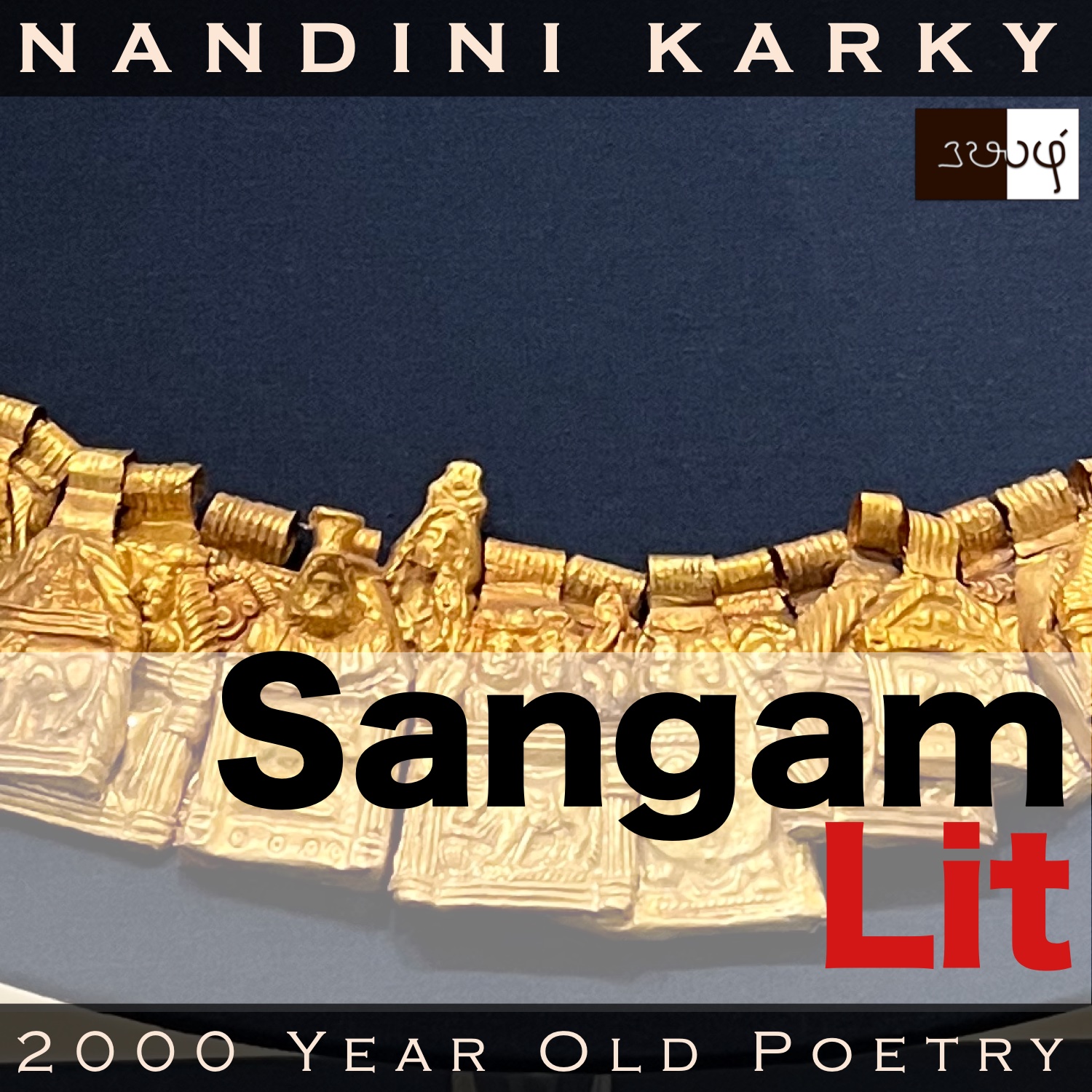Podcast: Play in new window | Download
Subscribe: Apple Podcasts | Spotify | Amazon Music | Android | iHeartRadio | Email | TuneIn | RSS | More

In this episode, we perceive the courage, fame and generosity of a king, as portrayed in Sangam Literary work, Puranaanooru 11, penned for the Chera King Paalai Paadiya Perunkadunko, by the poet Peymakal Ilaveyiniyaar. The verse is situated in the category of ‘Paadaan Thinai’ or ‘praise of a king’ and elaborates the joyous elements in the king’s town and the specifics of his rewards to performers.
அரி மயிர்த் திரள் முன்கை,
வால் இழை, மட மங்கையர்
வரி மணல் புனை பாவைக்குக்
குலவுச் சினைப் பூக் கொய்து,
தண் பொருநைப் புனல் பாயும்,
விண் பொரு புகழ், விறல் வஞ்சி,
பாடல் சான்ற விறல் வேந்தனும்மே,
வெப்பு உடைய அரண் கடந்து,
துப்பு உறுவர் புறம் பெற்றிசினே;
புறம் பெற்ற வய வேந்தன்
மறம் பாடிய பாடினியும்மே,
ஏர் உடைய விழுக் கழஞ்சின்,
சீர் உடைய இழை பெற்றிசினே;
இழை பெற்ற பாடினிக்குக்
குரல் புணர் சீர்க் கொளை வல் பாண் மகனும்மே,
என ஆங்கு,
ஒள் அழல் புரிந்த தாமரை
வெள்ளி நாரால் பூ பெற்றிசினே.
The king celebrated in this poem is a poet too, who has penned many intricate poems, depicting the ‘Aham’ or ‘inner world’ in Sangam works, such as Natrinai and Kurunthogai, specialising in the landscape of ‘Paalai’ or ‘drylands’, which talks about separation. It must take a special skill to sing of a king who is a skilled poet too. The words of this female poet can be translated as follows:
“With their well-rounded forearms covered with soft hair, young, innocent girls wearing shining jewels pluck flowers from curving branches to decorate their dolls made from streaked sand. Then, they dive into the cool ‘Porunai’ river in the renowned Vanji town, whose fame spreads to the skies.
The renowned king, who rules from this town, celebrated in poems, destroys forts of enemies and receives the sight of his enemies’ rear!
The female singer, who praises the courage of this strong king, who has seen such a defeat of his enemies, receives beautiful, heavy, well-crafted jewels from the king.
The skilled male singer, who sings in perfect accompaniment with the female singer – the one who received those jewels, receives a golden lotus crafted in the glowing fire, adorned with a silver string.”
Time to explore more about this Chera king! The poet talks about the young maiden in the land of this king, describing them as having fleshy arms, an indicator of health and beauty in the Sangam times. From the description of the hands of these maiden, the poet turns to their actions and mentions how they make sand dolls from the silt of the river and then decorate these dolls with the flowers from bent branches. Following this, the poet details how the maiden take a dive in the ‘Porunai river’ nearby. These joyous elements have been captured to describe the capital of this king – the town of ‘Vanji’.
Moving on from the town to the king, the poet talks of him as one, who is victorious in battle, and one, who makes his enemies scuttle from the battlefield. And when this victory is sung about by a female singer, she is awarded well-chosen, chunky ornaments. The male singer, who accompanies this female singer, is gifted a golden lotus, crafted from the fire, and woven around with a silver string. Such is the rich and aesthetic taste of the king who celebrates these poets so. In describing the gifts others received, this poet seems to be making a statement that she has not received the same and hopes to move the king into rendering gifts to her too.
What strikes me here is how so as to denote the prosperity and peace of a place, it’s to women, this Sangam poet turns to. They talk about how these maiden are healthy and happy, indulging in carefree play in the capital of this king. It brings to my mind certain countries that measure their wealth not by the economic ‘Gross Domestic Product’ but by the parameters of ‘Gross National Happiness’. As this age-old poem subtly demonstrates, if all countries would turn their focus in enhancing this ‘GNH’ and specifically the happiness of women, then the world entire would be a much better place!




Share your thoughts...